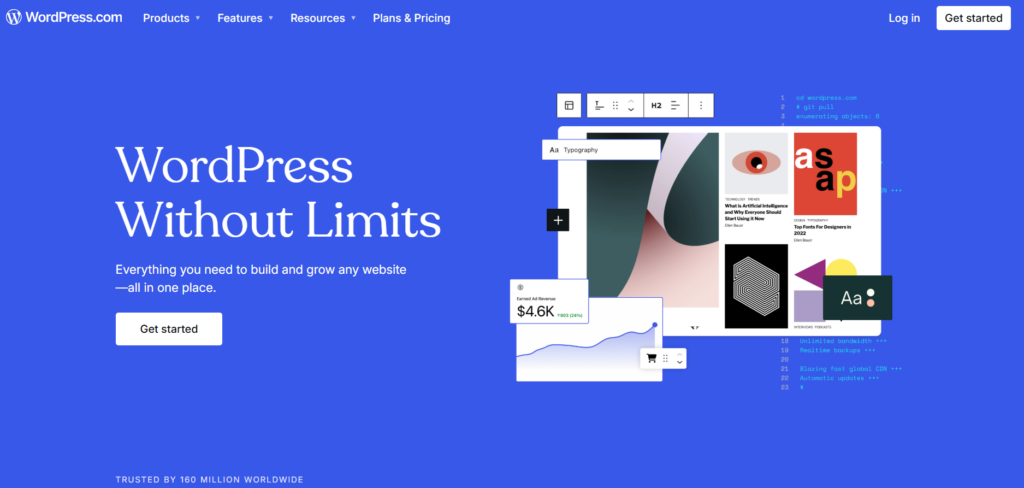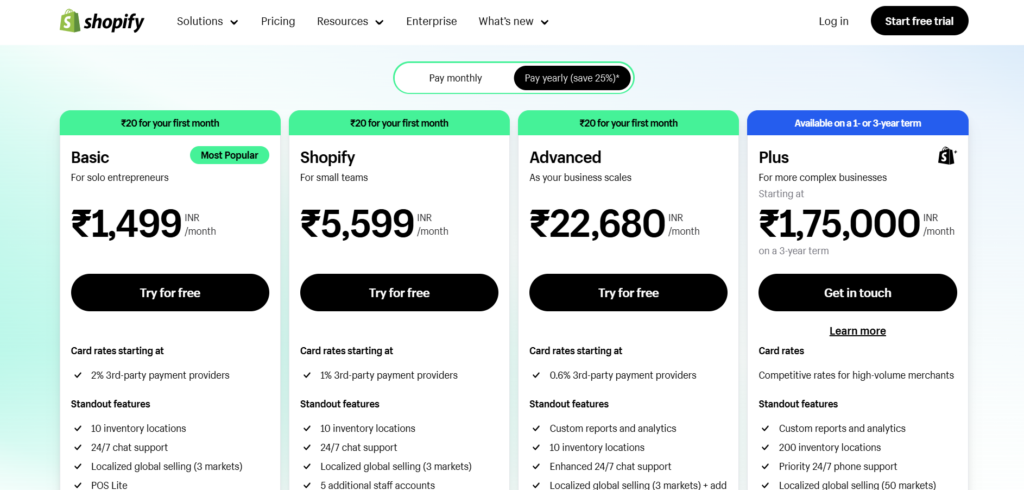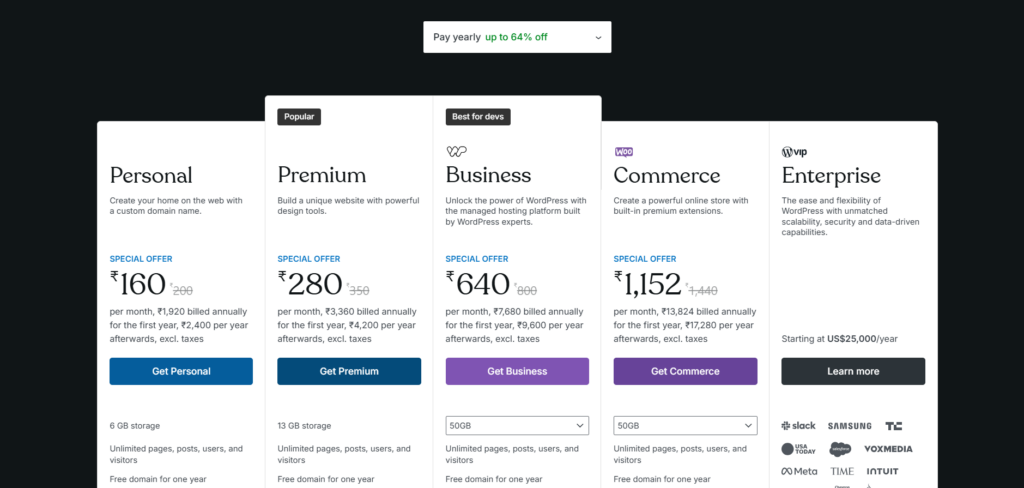When I was deciding between Shopify and WordPress, I realized the winner depends on your business needs. Shopify is the champion of simplicity.
It’s designed for e-commerce, offering built-in tools for managing products, payments, and shipping—all in one platform. It’s perfect if you want a hassle-free way to run your online store.
WordPress, on the other hand, is the king of flexibility. Pair it with WooCommerce, and you can create a highly customized e-commerce website. But it takes more time to set up and maintain, and you’ll need to handle hosting, plugins, and updates.
So, who’s the winner? Shopify is best for ease of use and scalability, while WordPress wins for creative control and versatility.
This guide will compare their features, costs, and best uses to help you decide which one takes the crown for your business.
Shopify
Shopify is a leading e-commerce platform that enables individuals and businesses to create and manage online stores with ease.

It offers a comprehensive suite of tools for website design, payment processing, inventory management, and marketing.
Shopify supports businesses of all sizes, from small startups to large enterprises, with customizable templates, integrations, and apps. Its user-friendly interface and powerful backend make it accessible for non-technical users while providing advanced features for developers.
Shopify also supports multichannel selling, allowing businesses to connect with customers across social media, marketplaces, and brick-and-mortar locations, empowering entrepreneurs to grow and scale their online presence efficiently.
[button-red url=”https://digitalmarketerr.com/recommends/shopify/” target=”_blank” position=”center”]🔥Try Shopify Now[/button-red]
WordPress
WordPress is a versatile, open-source content management system (CMS) that powers over 40% of websites globally. Launched in 2003, it enables users to create and manage websites without coding expertise.

It supports a wide range of uses, from personal blogs to e-commerce stores, thanks to its customizable themes and 60,000+ plugins.
WordPress offers two options: WordPress.com (hosted) and WordPress.org (self-hosted). Its user-friendly interface, scalability, and strong community support make it ideal for beginners and professionals.
Features include SEO optimization, mobile responsiveness, and extensive customization. With WordPress, anyone can build a functional, aesthetically pleasing, and powerful online presence.
[button-red url=”https://wordpress.com/” target=”_blank” position=”center”]🔥Try WordPress Now[/button-red]
Features Comparison: Shopify vs WordPress
Here’s a concise comparison of Shopify and WordPress based on features:
| Feature | Shopify | WordPress |
|---|---|---|
| Ease of Use | Beginner-friendly, all-in-one platform with a drag-and-drop interface. | Requires more setup and technical knowledge but highly flexible. |
| Hosting | Fully hosted, includes hosting in all plans. | Requires self-hosting (WordPress.org) or managed hosting (WordPress.com). |
| E-commerce Focus | Built specifically for e-commerce, offering seamless tools for online stores. | Versatile CMS with e-commerce capabilities via plugins (e.g., WooCommerce). |
| Customization | Limited to Shopify themes and apps; proprietary ecosystem. | Fully customizable; thousands of themes and plugins available. |
| Cost | Monthly subscription (starts at ~$29/month) + transaction fees unless using Shopify Payments. | Free CMS, but requires hosting and optional paid themes/plugins. |
| Plugins & Extensions | 8,000+ apps in Shopify App Store for e-commerce purposes. | 60,000+ plugins for various functionalities beyond e-commerce. |
| SEO | Basic SEO tools built-in, good for beginners. | Advanced SEO options with plugins like Yoast SEO or Rank Math. |
| Scalability | Highly scalable for e-commerce businesses of any size. | Scalable depending on hosting and plugins used. |
| Payment Gateways | Supports 100+ gateways but charges fees for third-party processors. | Supports various gateways via plugins without additional fees. |
| Blogging | Basic blogging functionality. | Comprehensive blogging features, ideal for content-heavy sites. |
| Security | Managed by Shopify with built-in SSL and PCI compliance. | Requires manual setup for security (SSL, firewalls, etc.) but customizable. |
| Community Support | Smaller community with official Shopify support. | Large community with forums, tutorials, and third-party support. |
Why Shopify Wins Overall
Shopify is purpose-built for e-commerce, offering ease of use, robust features, and dedicated support. While WordPress is powerful for those needing a customizable, multi-purpose site, Shopify excels in simplifying the complexities of running an online store. This makes Shopify the better choice for most businesses focused primarily on e-commerce.
Pricing Comparison: Shopify vs WordPress
Shopify Pricing
Shopify offers a range of pricing plans tailored to various business needs in India:

1. Starter Plan:
Priced at ₹399 per month, this plan is ideal for selling products through social media platforms and messaging apps. It does not include a full online store but allows for the creation of product links and buy buttons.
2. Basic Shopify:
At ₹1,499 per month (billed annually), this plan provides a complete online store with unlimited products, two staff accounts, and basic reports. It’s suitable for new businesses starting their online presence.
3. Shopify:
For ₹5,599 per month (billed annually), this plan includes all Basic features plus professional reports, five staff accounts, and standard reporting capabilities, making it ideal for growing businesses.
4. Advanced Shopify:
At ₹22,680 per month (billed annually), this plan offers advanced report building, up to 15 staff accounts, and third-party calculated shipping rates, catering to larger businesses with more complex needs.
5. Shopify Plus:
Starting at ₹1,75,000 per month on a 3-year term, this enterprise-level solution provides advanced features and customization options for high-volume businesses.
Please note that transaction fees apply when using third-party payment providers, varying by plan. Additionally, Shopify periodically offers promotional rates, such as ₹20 for the first month on select plans.
[button-red url=”https://digitalmarketerr.com/recommends/shopify/” target=”_blank” position=”center”]🔥Try Shopify Now[/button-red]
WordPress Pricing

Technically, WordPress is completely free to download and use – as is the ecommerce plugin WooCommerce. Simple, right?
Sadly, no. WordPress just facilitates the building of a website: it is up to you to find and download all the features and functionality you want, including essentials such as a hosting provider – all of which costs money. Here’s a breakdown of the average costs for maintaining a WordPress store:
WordPress offers various pricing plans tailored to different user needs. Here’s a breakdown of the available options:
| Plan | Cost (INR/month) | Features |
|---|---|---|
| Free | ₹0 | 1 GB storage, WordPress.com subdomain, basic design customization, ads displayed on your site. |
| Personal | ₹160 (billed annually) | 6 GB storage, free domain for one year, removal of WordPress.com ads, unlimited email support. |
| Premium | ₹280 (billed annually) | 13 GB storage, access to premium themes, advanced design customization, monetization options, Google Analytics integration. |
| Business | ₹640 (billed annually) | 200 GB storage, ability to install plugins and custom themes, advanced SEO tools, removal of WordPress.com branding, 24/7 priority support. |
| eCommerce | ₹1,152 (billed annually) | All Business plan features plus integrated eCommerce tools, ability to accept payments in over 60 countries, premium eCommerce themes. |
Note: Prices are based on annual billing; monthly billing may vary. Features and prices are subject to
The limitless possibilities of WordPress can quickly become a burden if you are not careful with everything you’re adding to your site.
Compared to Shopify, it’s a lot easier to lose track of spending with WordPress. Therefore, it falls to you to budget carefully and have a plan when signing up for WordPress – something you don’t need to do with Shopify.
For a hosting provider, we recommend the Bluehost Online Store plans for WordPress. The Basic plan begins as low as $6.99 per month (billed annually) for the first year (afterward, it will renew at the regular rate of $15.99 per month) and will net you a free domain, free professional email, free SSL certificate, and 40GB of storage – if you need more, you can always upgrade your plan.
[button-red url=”https://wordpress.com/” target=”_blank” position=”center”]🔥Try WordPress Now[/button-red]
Why Shopify Wins
| Criteria | Shopify | WordPress |
|---|---|---|
| Predictable Costs | Fixed pricing plans cover hosting, SSL, and security. | Costs vary based on hosting, plugins, themes, and customizations. |
| Time Efficiency | Simple setup and maintenance. | Requires more time for setup, configuration, and updates. |
| E-commerce Focus | Built specifically for online stores with optimized features. | Requires WooCommerce or similar plugins to add e-commerce capabilities. |
| Support | 24/7 dedicated support for all plans. | No centralized support; relies on forums and third-party providers. |
[button-red url=”https://digitalmarketerr.com/recommends/shopify/” target=”_blank” position=”center”]🔥Try Shopify Now[/button-red]
The Final Verdict
Shopify is the better choice for businesses focused on e-commerce due to its all-in-one, user-friendly platform.
Unlike WordPress, which requires hosting, plugins, and technical expertise to build an online store, Shopify offers a seamless experience with integrated tools for inventory management, payment processing, and shipping.
Its extensive app ecosystem and scalability make it ideal for growing businesses. For those prioritizing simplicity, reliability, and specialized e-commerce features, Shopify provides a hassle-free, powerful solution, making it the superior choice over WordPress.
[button-red url=”https://digitalmarketerr.com/recommends/shopify/” target=”_blank” position=”center”]🔥Try Shopify Now[/button-red]
FAQ’s
Which is easier to use?
Shopify is easier to use with an all-in-one interface; WordPress requires technical knowledge for setup.
Which is better for e-commerce?
Shopify is purpose-built for e-commerce, offering robust features out of the box.
Which is more cost-effective?
WordPress can be cheaper but requires plugins and maintenance; Shopify has predictable pricing.
Which offers better support?
Shopify includes 24/7 dedicated support; WordPress relies on community forums and third-party help.
What about scalability?
Shopify scales automatically, while WordPress needs hosting upgrades and optimizations.
